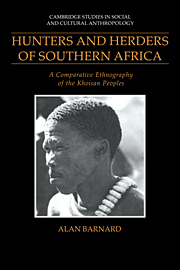Book contents
- Frontmatter
- Contents
- List of figures and maps
- List of tables
- Preface
- A note on orthography
- Part I The Khoisan peoples
- Part II A survey of Khoisan ethnography
- Part III Comparisons and transformations
- 12 Settlement and territoriality among the desert-dwelling Bushmen
- 13 Politics and exchange in Khoisan society
- 14 Aspects of Khoisan religious ideology
- 15 Bushman kinship: correspondences and differences
- 16 Khoe kinship: underlying structures and transformations
- 17 Conclusions
- References
- Index
- Cambridge Studies in Social and Cultural Anthropology
13 - Politics and exchange in Khoisan society
Published online by Cambridge University Press: 05 June 2012
- Frontmatter
- Contents
- List of figures and maps
- List of tables
- Preface
- A note on orthography
- Part I The Khoisan peoples
- Part II A survey of Khoisan ethnography
- Part III Comparisons and transformations
- 12 Settlement and territoriality among the desert-dwelling Bushmen
- 13 Politics and exchange in Khoisan society
- 14 Aspects of Khoisan religious ideology
- 15 Bushman kinship: correspondences and differences
- 16 Khoe kinship: underlying structures and transformations
- 17 Conclusions
- References
- Index
- Cambridge Studies in Social and Cultural Anthropology
Summary
Introduction
Politics and exchange are broad issues which touch a great variety of concerns within Khoisan ethnography. The purpose of this chapter is not to cover the vast literature on the subject. Most of the topics discussed in this literature are touched on in Part II of this monograph; and detailed, if sometimes conflicting, studies of political and economic relations are readily available (e.g., Lee 1979b; Wilmsen 1989a). The politics of gender relations is also well covered, especially for the !Kung (e.g., Lee 1974; 1979b: 250–80; 1981 [1978]; Draper 1975a; 1975b; see also Chapter 3). The specifics of politics among the Khoekhoe are dealt with in the historical literature (e.g., Bley 1971 [1968]; Bridgman 1981), and need not concern us here (see also Chapter 10).
Rather, my purpose here is to raise a few questions of topical interest and some questions of relevance to regional comparative concerns. Oddly, comparative interests do not figure strongly in the literature on politics and economics. No one since Schapera (1930) has made any serious attempt to understand Khoekhoe exchange relations in terms of wider Khoisan interests, and no one among current writers on Bushman society seems to have taken any comparative interest at all in the politico-economic systems of the Khoekhoe or Damara.
- Type
- Chapter
- Information
- Hunters and Herders of Southern AfricaA Comparative Ethnography of the Khoisan Peoples, pp. 237 - 250Publisher: Cambridge University PressPrint publication year: 1992

